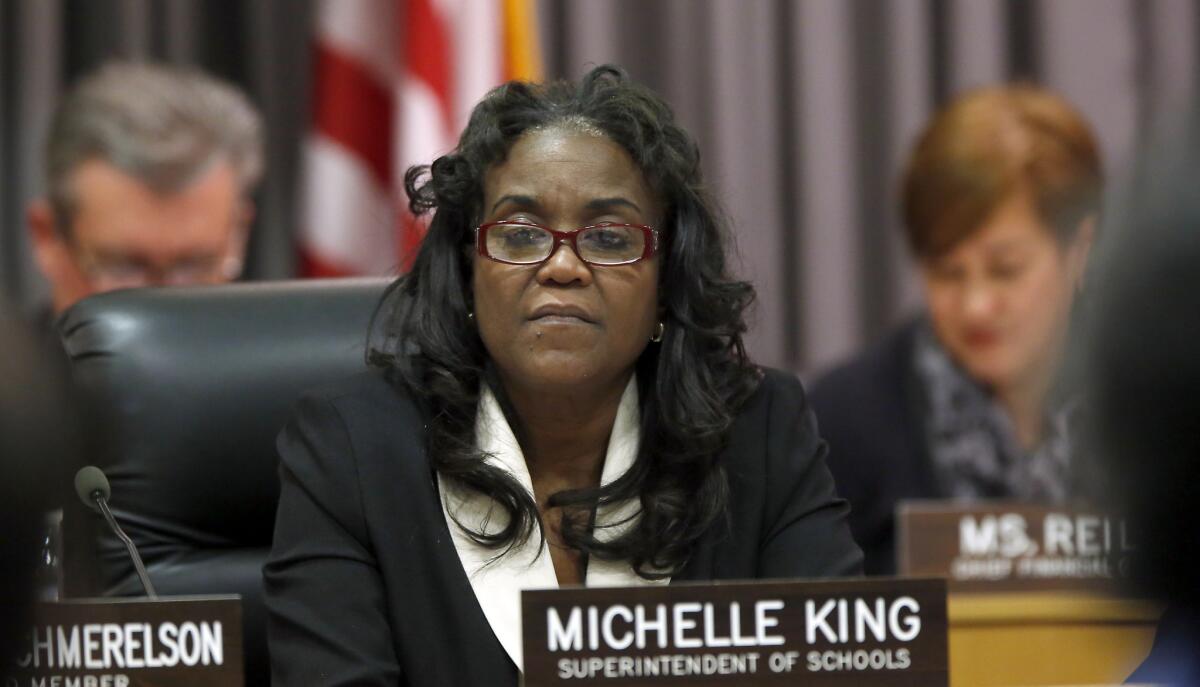With new superintendent in place, L.A. school board gears for battle on charter plan

The Los Angeles Board of Education’s resolution is effectively a symbolic gesture, but it highlights a key challenge for the district’s new superintendent, Michelle King.
A day after unanimously selecting a new leader, the Los Angeles Board of Education once again found common ground by offering its first public opposition to a controversial $490-million proposal to increase the number of charter schools in the Los Angeles Unified School District.
Board members have traditionally been divided on charter school growth, but on Tuesday they voted 7 to 0 in support of a resolution opposing initiatives that “view our communities as a public education marketplace and our children as commodities.”
The board then directed new Supt. Michelle King to analyze how the outside plan, which was developed by the Broad Foundation, will “affect the district’s enrollment, fiscal viability and ability to provide an outstanding public education.”
A draft of the plan proposes 260 new charters in L.A. The schools, combined with existing charters, would enroll half of the district’s 650,000 students.
Supporters of the proposal say they seek to improve options for parents unsatisfied with traditional public schools. But L.A. Unified leaders say the plan threatens the sustainability of the district and could hurt its ability to serve students.
“I think it is important to point out that this plan was not created to strengthen L.A. Unified and we want that to be on the record,” board member Monica Ratliff said. “In the long run, we have to get something on the table about the impact that it has on the district and the impact that it has on our ability to meet our promises to our employees.”
Charter schools are publicly funded, independently operated and not tethered to some of the regulations that apply to traditional schools. Most charter schools are nonunion.
The board’s resolution is effectively a symbolic gesture, but it highlights a key challenge for the district’s new superintendent.
Declining enrollment and the cost of providing employee benefits are among the drivers of a projected long-term deficit at the district. Because districts are funded based on student enrollment, L.A. Unified stands to lose millions of dollars if the charter plan is successful.
The non-profit organization that is leading the effort to vastly expand charter schools in Los Angeles said Wednesday that the board’s resolution will not change its goal of improving opportunities for students in “underserved” neighborhoods.
“We look forward to working collaboratively with LAUSD, including the new Superintendent, to achieve that goal,” said Anita Landecker, interim executive director of Great Public Schools Now.
She said that charter proponents are still gathering input before releasing a final plan.
After being named superintendent on Monday, King said she was neither for nor against the charter expansion proposal: “I am about L.A. Unified’s plan.”
King, who signed a $350,000 annual contract Tuesday, also said little about the expansion plan, simply asking board members for precise guidance on their directive.
“When you’re clear and you define what specifically we are looking at, then staff can go in and analyze that and look for the fiscal concerns, the enrollment impact and all the other impacts around this specific plan,” she said.
School board members said they were not against charter schools, acknowledging that the district had not done enough to serve its students. Charter schools, they said, serve a purpose, as do magnet schools and other academic programs.
Board members Monica Garcia and George McKenna said the district has failed some communities.
“We have not as a district admitted openly our culpability and our own ineffectiveness in educating our children,” McKenna said.
He added that children in areas such as South Los Angeles have benefited from charters. “There are some wonderful charter schools out there and I’m glad they exist because they’re saving my kids.”
The board’s resolution initially drew ire from charter school supporters, but it later waned.
Board member Scott Schmerelson, who authored the resolution, agreed to make changes proposed by other board members to soften some of the language describing charter schools, such as removing the word strangulation from a sentence describing the plan.
Schmerelson said he struggled to understand why Eli Broad and others did not work to improve traditional public schools by investing in successful programs.
“The point is that we have thrown the glove down to big business and they know they’d better be very careful how they work with LAUSD,” he said. “We’ll accept their help in limited forms, but they will not take over our district.”
Sarah Angel, managing director of regional advocacy with the California Charter School Assn., told board members that the resolution was polarizing. But board discussion settled some of her concerns.
“There is the sense right now that the school board is more open than before to seeking genuine solutions and common ground, hopefully without sacrificing urgency on behalf of families that need better schools,” Angel said.
Times staff writer Howard Blume contributed to this report.
Education Matters receives funding from a number of foundations. The California Community Foundation and United Way of Greater Los Angeles administer grants from the Baxter Family Foundation , the Broad Foundation, the California Endowment and the Wasserman Foundation to support this effort. Under terms of the grants, the Times retains complete control over editorial content.
More to Read
Sign up for Essential California
The most important California stories and recommendations in your inbox every morning.
You may occasionally receive promotional content from the Los Angeles Times.











